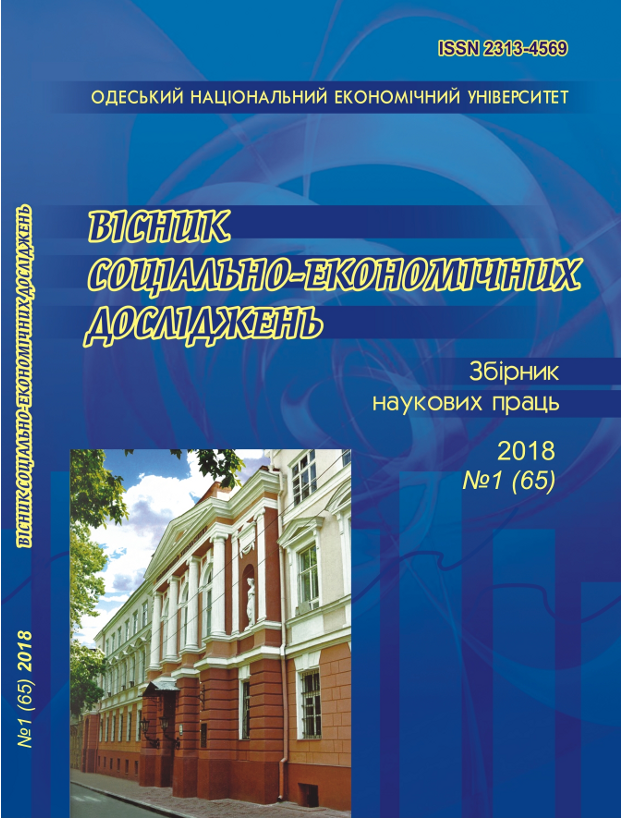Social capital as a factor of economic development of society
DOI:
https://doi.org/10.33987/vsed.1(65).2018.24-34Keywords:
social capital, socio-economic development, civil society, indicators of civil society development, social capital indexes, institutional reformsAbstract
The article deals with the commonalities and particularities in theoretical and methodological approaches to studying the essence of social capital of the founders of this theory P. Bourdieu, J. Coleman and R. Patnama. It is emphasized that despite the different object of research and the availability of specific features of the analysis of functional forms of social capital, the vision of this phenomenon as a personification of social relationships that bring an individual or public benefit are common for all three approaches. The dependence of socio-economic development of society on the quality of social capital is revealed. It is proposed to consider social capital as a resource, through which new more effective institutions are formed and distributed. The essence of civil society and its influence on economic processes are revealed. The necessary prerequisites for the formation of civil society are identified and peculiarities of its development in Ukraine and other countries are determined. The relationship between social capital and civil society is shown. The indexes of sustainability of civil society organizations, rule of law, levels of democracy and confidence in politicians as indicators of the development of civil society and social capital in individual countries are analyzed. The necessity of improving the state of social interaction and trust is emphasized in order to accelerate our country’s exit from a protracted socio-economic and political crisis. The directions of revitalization of social and political activity of citizens are offered and the possibilities of using the notion of social capital in the study of the effectiveness of institutional reforms in Ukraine are outlined.
References
Geets, V. M. (2011). The development of social capital – the greatest wealth in the world [Rozvytok sotsialnoho kapitalu – naibilshe bahatstvo u sviti], Viche: zhurnal Verkhovnoi Rady Ukrainy, No. 1, available at: http://www.viche.info/journal/2359 [in Ukrainian]
Hrishnova, O. A., Kochuma, І. Yu. (2009). Social capital in the system of economic resources [Sotsialnyi kapital u systemi ekonomichnykh resursiv], Sotsioekonomika, No. 4, s. 38–49 [in Ukrainian]
Social capital of Ukraine: theoretical and methodological foundations of formation: monograph (2010). Ed. by S. I. Bandur [Sotsialnyi kapital Ukrainy: teoretyko-metodolohichni osnovy formuvannia: monohrafiia; za red. S. I. Bandura], NAN Ukrainy, Rada po vyvchenniu produktyvnykh syl Ukrainy, Kyiv, 210 s. [in Ukrainian]
Shapovalova, T. V. (2016). Social capital: theoretical foundations and strategies for transformation: monograph [Sotsialnyi kapital: teoretychni zasady ta stratehii transformatsii: monohrafiia], Sievierodonetsk, Vyd-vo SNU im. V. Dalia, 360 s. [in Ukrainian]
Stepanenko, V. (2001). Social capital in the sociological perspective: theoretical and methodological aspects of the study [Sotsialnyi kapital u sotsiolohichnii perspektyvi: teoretyko-metodychni aspekty doslidzhennia], Sotsiolohiia: teoriia, metody, marketynh, No. 2, s. 24–41 [in Ukrainian]
Kolodiy, A. F. (2002). On the way to civil society. Theoretical foundations and socio-cultural preconditions of democratic transformation in Ukraine: monograph [Na shliakhu do hromadianskoho suspilstva. Teoretychni zasady i sotsiokulturni peredumovy demokratychnoi transformatsii v Ukraini: monohrafiia], Chervona Kalyna, Lviv, 346 s. [in Ukrainian]
Zhalilo, Ya. A. (2009). Theory and practice of formation of an effective state: monograph [Teoriia ta praktyka formuvannia efektyvnoi derzhavy: monohrafiia], NISD, Kyiv, 336 s. [in Ukrainian]
Bourdieu, P. (2002). Forms of capital [Formy kapitala], Ekonomicheskaya sotsiologiya, T. 3, No. 5, s. 60–74, available at: http://ecsoc.hse.ru/data/670/586/1234/ecsoc_t3_n5.pdf [in Russian]
Coleman, J. (2001). Social and human capital [Kapital sotsialnyy i chelovecheskiy], Obschestvennye nauki i sovremennost, No. 3, s. 121–139 [in Russian]
Patnam, R. Leonardi, R., Nanetti, R. (2001). Creation of democracy. Traditions of social activity in modern Italy [Tvorennia demokratii. Tradytsii hromadskoi aktyvnosti v suchasnii Italii], Osnovy, Kyiv, 302 s. [in Ukrainian]
Pylypenko, A. N., Litvinenko, N. I. (2015). Ukrainian mentality in the coordinates of research program of G. Hofstede [Ukrainska mentalnist u koordynatakh doslidnytskoi prohramy H. Khofsteda], Ekonomichnyi visnyk NHU, No. 2, s. 14–22 [in Ukrainian]
Sustainability index of civil society organizations 2015 [Indeks ustoychivosti organizatsiy grazhdanskogo obschestva 2015], available at: http://actngo.info/sites/default/files/files/indeks_ustoychivosti_ogo_2015_rus_0.pdf [in Russian]
Sustainability index of civil society organizations 2016 [Indeks ustoychivosti orhanizatsiy grazhdanskogo obschestva 2016], available at: http://www.actngo.info/sites/default/files/files/indeks_ustoychivosti_ogo_2016.pdf [in Russian]
Galchinsky, A. (2011). Liberalism: lessons for Ukraine [Liberalizm: uroky dlia Ukrainy: nauk.-popul. ese], Lybid, Kyiv, 288 s. [in Ukrainian]
Index of the rule of law in the countries of the world [Indeks verkhovenstva zakona v stranakh mira], available at: http://gtmarket.ru/research/rule-of-law-index/info [in Russian]
Rating of countries by the level of democracy [Reyting stran po urovnyu demokratii], available at: http://gtmarket.ru/ratings/democracy-index/info [in Russian]
World Atlas of Data [Mirovoy Atlas Dannykh], available at: https://knoema.ru/atlas [in Russian]
Downloads
Published
Issue
Section
License
Copyright (c) 2019 Socio-Economic Research Bulletin

This work is licensed under a Creative Commons Attribution 4.0 International License.






